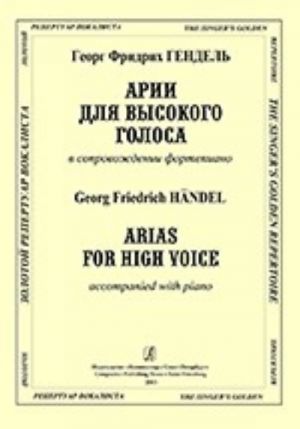The proposed arias are remarkable not only for the highest artistic merits, but also represent a remarkable teaching material in particular contributing to development of cantilena. In this collection they are arranged with ascending difficulty. The first three of them can be sung by both sopranos and tenors. Auchsa's aria from the oratorio "Joshua" ("Jesus Navin") and Song about Susanna from the oratorio "Susanna" are assigned to a female voice, but by their contents are suitable also for a male one. The other three arias are purely female. Here "Dignare" is for the first time published in the tonality for a high pitch voice, that doesn't contradict its spiritual contents.
In view of general practice of Handel's works stage performance, texts of arias from oratorios are provided in the collection in three languages - German, English and Russian. In "Dignare" and Melissa's aria both texts in Latin - Russian and Italian - Russian are provided accordingly. Arias from the operas "Ariadna" and "Rodelinda" are provided only with Italian. In any case the Russian text shall serve mainly for the acquaintance with the contents, for arias are preferably performed with the original text that in all cases is presented first.
Contents:
Aria. From the oratorio "Messiah"
Dignare. From "Te Deum"
Song about Susanna. From the oratorio "Susanna"
Aria of Auchsa. From the oratorio "Joshua"
Aria of Mellissa. From the opera "Amadigi"
Aria of Ariadna. From the opera "Ariadna"
Aria of Rodelinda. From the opera "Rodelinda"
Notes
The proposed arias are remarkable not only for the highest artistic merits, but also represent a remarkable teaching material in particular contributing to development of cantilena. In this collection they are arranged with ascending difficulty. The first three of them can be sung by both sopranos and tenors. Auchsa's aria from the oratorio "Joshua" ("Jesus Navin") and Song about Susanna from the oratorio "Susanna" are assigned to a female voice, but by their contents are suitable also for a male one. The other three arias are purely female. Here "Dignare" is for the first time published in the tonality for a high pitch voice, that doesn't contradict its spiritual contents.
In view of general practice of Handel's works stage performance, texts of arias from oratorios are provided in the collection in three languages - German, English and Russian. In "Dignare" and Melissa's aria both texts in Latin - Russian and Italian - Russian are provided accordingly. Arias from the operas "Ariadna" and "Rodelinda" are provided only with Italian. In any case the Russian text shall serve mainly for the acquaintance with the contents, for arias are preferably performed with the original text that in all cases is presented first.
Contents:
Aria. From the oratorio "Messiah"
Dignare. From "Te Deum"
Song about Susanna. From the oratorio "Susanna"
Aria of Auchsa. From the oratorio "Joshua"
Aria of Mellissa. From the opera "Amadigi"
Aria of Ariadna. From the opera "Ariadna"
Aria of Rodelinda. From the opera "Rodelinda"
Notes
Предлагаемые арии не только обладают высочайшими художественными достоинствами, но и представляют собой замечательный учебный материал, в особенности способствующий выработке кантилены.
В настоящем сборнике арии расположены в порядке возрастания трудности. Первые три из них могут петь как сопрано, так и тенора. Ария Акзы из оратории "Иисус Навин" и Песня о Сусанне из оратории "Сусанна" поручены женскому голосу, но по содержанию подходят и мужскому. Остальные три арии - чисто женские. "Dignare" впервые издается здесь в тональности для высокого голоса, что не противоречит ее духовному содержанию.
Ввиду обычной практики исполнения сценических произведений Генделя тексты арий из ораторий даны в сборнике на трех языках - немецком, английском и русском. В "Dignare" и Арии Мелиcсы приведены соответственно тексты латинский и русский и итальянский и русский. Арии из опер "Ариадна" и "Роделинда" даны только на итальянском. В любом случае русский текст должен служить главным образом для ознакомления с содержанием, исполнять же арии желательно с оригинальным текстом, который во всех случаях приводится первым.
Содержание:
Ария. Из оратории "Мессия". Перевод М. Шехтман
Dignare. Из "Te Deum". Русский текст М. Шехтман
Песня о Сусанне. Из оратории "Сусанна". Русский текст Н. Райского
Ария Акзы. Из оратории "Иисус Навин". Перевод М. Шехтман
Ария Мелиссы. Из оперы "Амадис". Русский текст Н. Райского
Ария Ариадны. Из оперы "Ариадна"
Ария Роделинды. Из оперы "Роделинда"
Примечания
Predlagaemye arii ne tolko obladajut vysochajshimi khudozhestvennymi dostoinstvami, no i predstavljajut soboj zamechatelnyj uchebnyj material, v osobennosti sposobstvujuschij vyrabotke kantileny.
V nastojaschem sbornike arii raspolozheny v porjadke vozrastanija trudnosti. Pervye tri iz nikh mogut pet kak soprano, tak i tenora. Arija Akzy iz oratorii "Iisus Navin" i Pesnja o Susanne iz oratorii "Susanna" porucheny zhenskomu golosu, no po soderzhaniju podkhodjat i muzhskomu. Ostalnye tri arii - chisto zhenskie. "Dignare" vpervye izdaetsja zdes v tonalnosti dlja vysokogo golosa, chto ne protivorechit ee dukhovnomu soderzhaniju.
Vvidu obychnoj praktiki ispolnenija stsenicheskikh proizvedenij Gendelja teksty arij iz oratorij dany v sbornike na trekh jazykakh - nemetskom, anglijskom i russkom. V "Dignare" i Arii Melicsy privedeny sootvetstvenno teksty latinskij i russkij i italjanskij i russkij. Arii iz oper "Ariadna" i "Rodelinda" dany tolko na italjanskom. V ljubom sluchae russkij tekst dolzhen sluzhit glavnym obrazom dlja oznakomlenija s soderzhaniem, ispolnjat zhe arii zhelatelno s originalnym tekstom, kotoryj vo vsekh sluchajakh privoditsja pervym.
Soderzhanie:
Arija. Iz oratorii "Messija". Perevod M. Shekhtman
Dignare. Iz "Te Deum". Russkij tekst M. Shekhtman
Pesnja o Susanne. Iz oratorii "Susanna". Russkij tekst N. Rajskogo
Arija Akzy. Iz oratorii "Iisus Navin". Perevod M. Shekhtman
Arija Melissy. Iz opery "Amadis". Russkij tekst N. Rajskogo
Arija Ariadny. Iz opery "Ariadna"
Arija Rodelindy. Iz opery "Rodelinda"
Primechanija













